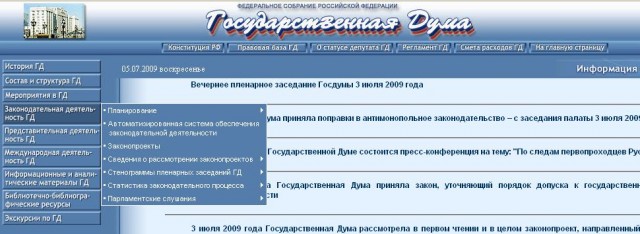Freak Sites
The problem of the interaction of the state apparatus with citizens in our country has existed for a long time. And the need to obtain information from government bodies exists. Here, for example, let slip some minister on the "first" about the introduction of certain benefits. Sweeten, so to speak, a bitter crisis pill. And where to look for them, how to achieve the execution of their rights is not clear.

It would seem that the 21st century is a time of a jump in telecommunications and the Internet. There should be no problems. But it was not there! You look at any site that represents a government structure. For example (and let the admins of these home-made products enjoy at least some links to their obscene web resources):
')
The State Duma
Moscow Training Foundation
Any third-rate online store has a decent design. The problem is not only in design. The information is structured and outlined just awful. You can list the disadvantages for hours. In general, these “products” do not stand up to scrutiny either from the point of view of a professional or from the point of view of an ordinary user. Oh, to throw a couple of these creations in a business lynch to Lebedev. Why, they can cover up ... And now let's imagine what budgets are allocated for these "Internet crafts" ...
[submitted ...]
But it's not quite like that. Government agencies that have deeper public relations goals have taken the site building process more seriously. These are, for example, the sites of the president , the government and the prosecutor general’s office . On them, we are unlikely to find information that is useful to a specific person, but in abundance we will be able to enjoy sufficiently high-quality PR materials in different languages with vivid photos and pretentious word combinations.
Like this. And in your collection there are government sites, worthy of the Internet kuntskamery?

It would seem that the 21st century is a time of a jump in telecommunications and the Internet. There should be no problems. But it was not there! You look at any site that represents a government structure. For example (and let the admins of these home-made products enjoy at least some links to their obscene web resources):
')
The State Duma
Moscow Training Foundation
Any third-rate online store has a decent design. The problem is not only in design. The information is structured and outlined just awful. You can list the disadvantages for hours. In general, these “products” do not stand up to scrutiny either from the point of view of a professional or from the point of view of an ordinary user. Oh, to throw a couple of these creations in a business lynch to Lebedev. Why, they can cover up ... And now let's imagine what budgets are allocated for these "Internet crafts" ...
[submitted ...]
But it's not quite like that. Government agencies that have deeper public relations goals have taken the site building process more seriously. These are, for example, the sites of the president , the government and the prosecutor general’s office . On them, we are unlikely to find information that is useful to a specific person, but in abundance we will be able to enjoy sufficiently high-quality PR materials in different languages with vivid photos and pretentious word combinations.
Like this. And in your collection there are government sites, worthy of the Internet kuntskamery?
Source: https://habr.com/ru/post/63634/
All Articles